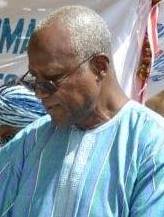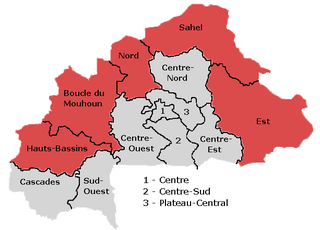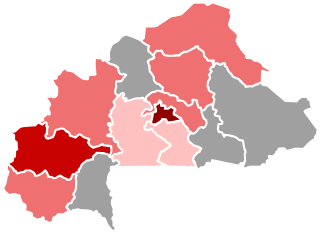| |||||
| Decades: | |||||
|---|---|---|---|---|---|
| See also: | |||||
| |||||
| Decades: | |||||
|---|---|---|---|---|---|
| See also: | |||||
Ongoing: COVID-19 pandemic and terrorism in Burkina Faso

Burkina Faso is a landlocked country in West Africa with an area of 274,200 km2 (105,900 sq mi), bordered by Mali to the northwest, Niger to the northeast, Benin to the southeast, Togo and Ghana to the south, and the Ivory Coast to the southwest. As of 2021, the country had an estimated population of 20,321,378. Previously called Republic of Upper Volta (1958–1984), it was renamed Burkina Faso by President Thomas Sankara. Its citizens are known as Burkinabè, and its capital and largest city is Ouagadougou. Its name is often translated into English as the "Land of Honest Men".

Christianity is a minority religion in Burkina Faso.
The following lists events that happened during 2016 in Burkina Faso.

On 19 January 2019, the government of Burkina Faso dissolved due to the resignation of Prime Minister Paul Kaba Thieba and all members of his cabinet. President of Burkina Faso Roch Marc Christian Kaboré announced that he intends to form a new government; on 21 January, he began the process of appointing a new government by naming Christophe Joseph Marie Dabiré as the new Prime Minister, but his cabinet remains vacant. In the days leading up to the resignation of the government, the country faced a number of attacks from militant terrorist groups, and opposition members of government had previously called for the prime minister and defense ministries to step down, citing an inability to address terrorist attacks.

Christophe Joseph Marie Dabiré is a Burkinabé politician who served as the Prime Minister of Burkina Faso from 24 January 2019 to 9 December 2021. He was appointed to the position of Prime Minister by President Roch Marc Christian Kaboré following the resignation of Paul Kaba Thieba and his cabinet. Dabiré had previously represented Burkina Faso at the West African Economic and Monetary Union, and went on to serve as a minister under former president Blaise Compaoré from 1994 to 1996, with Kaboré holding the title of Prime Minister.

Terrorism in Burkina Faso refers to non-state actor violence in Burkina Faso carried out with the intent of causing fear and spreading extremist ideology. Terrorist activity primarily involves religious terrorism conducted by foreign-based organizations, although some activity occurs because of communal frustration over the lack of economic development. Recent attacks have concentrated in the Hauts-Bassins, Boucle du Mouhoun, Nord, Sahel, and Est regions, along the border with Mali and Niger. A series of attacks in Ouagadougou in 2016, 2017, and 2018 by al-Qaeda in the Islamic Maghreb and its affiliates garnered international attention.

Burkina Faso–Spain relations are the bilateral and diplomatic relations between these two countries. Burkina Faso does not have an embassy in Spain, but its embassy in Paris, France, is accredited to Spain. and consulates in Almería, Barcelona, Madrid and Valencia. Spain has no embassy in Burkina Faso, but its embassy in Abidjan, Ivory Coast is accredited to Burkina Faso, and a consulate in Ouagadougou.

The COVID-19 pandemic in Burkina Faso was a part of the ongoing worldwide pandemic of coronavirus disease 2019 caused by severe acute respiratory syndrome coronavirus 2. The virus was confirmed to have reached Burkina Faso on 9 March 2020. The death of Rose Marie Compaoré, a member of the National Assembly of Burkina Faso, on 18 March marked the first recorded fatality due to COVID-19 in Sub-Saharan Africa.
Events in the year 2019 in Burkina Faso.
This article lists events from the year 2021 in Niger.
On 3 May 2021, Islamic militants attacked Kodyel, a village in Foutouri, Burkina Faso. The attack left at least 30 people dead and another 20 injured.

Roberto Fraile Fernández was a Spanish journalist and cameraman.

An ongoing war and civil conflict between the Government of Burkina Faso and Islamist rebels began in August 2015 and has led to the displacement of over 2 million people and the deaths of at least 10,000 civilians and combatants.

An Islamist insurgency has been ongoing in the Sahel region of West Africa since the 2011 Arab Spring. In particular, the intensive conflict in the three countries of Mali, Niger and Burkina Faso has been referred to as the Sahel War.

The siege of Djibo is an ongoing blockade of the city of Djibo in Burkina Faso by several factions of Jihadist Islamist rebels. The siege began in February 2022, and is part of the Jihadist insurgency in Burkina Faso.
On August 4, 2022, jihadist militants ambushed a counter-terrorism operation organized by the Burkina Faso Armed Forces, killing four civilians and nine VDP militiamen. The Burkinabe government claimed that thirty-four insurgents were killed immediately after the attack.
Events in the year 2023 in Mali.